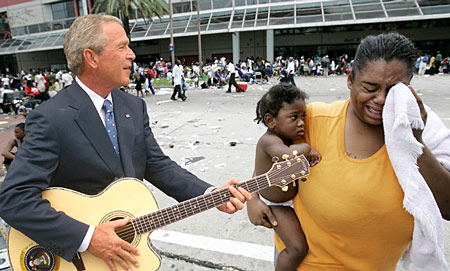From Metamute comes this story; please read it…
by Larry Bradshaw and Lorrie Beth Slonsky
Two paramedics stranded in New Orleans in the wake of hurricane Katrina give their account of self-organisation and abandonment in the disaster zone
From a woman with a battery powered radio we learned that the media was talking about us. Up in full view on the freeway, every relief and news organizations saw us on their way into the City. Officials were being asked what they were going to do about all those families living up on the freeway? The officials responded they were going to take care of us. Some of us got a sinking feeling. “Taking care of us” had an ominous tone to it.
Unfortunately, our sinking feeling (along with the sinking City) was correct.
Just as dusk set in, a Gretna Sheriff showed up, jumped out of his patrol vehicle, aimed his gun at our faces, screaming, “Get off the fucking freeway”. A helicopter arrived and used the wind from its blades to blow away our flimsy structures. As we retreated, the sheriff loaded up his truck with our food and water.
Once again, at gunpoint, we were forced off the freeway. All the law enforcement agencies appeared threatened when we congregated or congealed into groups of 20 or more. In every congregation of “victims” they saw “mob” or “riot”. We felt safety in numbers. Our “we must stay together” was impossible because the agencies would force us into small atomized groups.
In the pandemonium of having our camp raided and destroyed, we scattered once again. Reduced to a small group of 8 people, in the dark, we sought refuge in an abandoned school bus, under the freeway on Cilo Street. We were hiding from possible criminal elements but equally and definitely, we were hiding from the police and sheriffs with their martial law, curfew and shoot-to-kill policies.
The next days, our group of 8 walked most of the day, made contact with New Orleans Fire Department and were eventually airlifted out by an urban search and rescue team. We were dropped off near the airport and managed to catch a ride with the National Guard. The two young guardsmen apologized for the limited response of the Louisiana guards. They explained that a large section of their unit was in Iraq and that meant they were shorthanded and were unable to complete all the tasks they were assigned.
